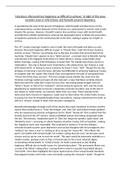'Literature often portrays happiness as difficult to achieve.' In light of this view,
consider ways in which Ibsen and Rossetti present happiness.
In questioning the ease of the pursuit of happiness, both Rossetti and Ibsen focus on the
contemporaneous societal obstacles of the Victorian era, particularly for women, that would
impede this journey. However, Rossetti’s poetry also examines issues with mental health
and faith that prohibit contentment, whereas the playwright seems to blame the prevention
of happiness primarily on the societal bounds of the time, making it appear far simpler to
achieve.
The 19th century marriage market is seen in both the work of Rossetti and Ibsen as a key
element that made happiness difficult to gain. In ‘Maude Clare’, both the titular character
and her ex-lover ‘Thomas’ are unhappy due to the laws of society that prevent them from
marrying. ‘Maude Clare’ appears to be a “fallen woman”, a concept close to Rossetti, having
volunteered at the Highgate Penitentiary for Fallen Women, having ‘waded ankle deep’
before marriage, causing critic McNamara to assert that “for Maude Clare there can be no
redemption”. Not only is Maude Clare restricted to a life without love, but Thomas is ‘pale
with inward strife’ at having to marry someone he doesn’t ‘love’: ‘Nell’. Though she has the
privilege of marrying a man she loves, Nell also has difficulties in achieving happiness, having
to compete with the ‘queen’-like Maude Clare and experience the pain of unrequited love:
‘I’ll love him till he loves me best’. This love triangle clearly exhibits the strain that the
Victorian marriage system put upon all who took part, a view that Ibsen certainly shared.
Both Nora and Mrs Linde don’t marry for true love, Nora being swept straight from her
‘father’s house’ to that of her ‘husband’s’ and becoming his ignorant ‘doll’, and Mrs Linde
abandoning an opportunity to love for a desperate economic incentive, due to the lack of
any means to ‘make money’ as a woman, other than via a man. These societal norms
obstructed both characters’ happiness, made clear by Ibsen when Mrs Linde finally chooses
to pursue her love for Krogstad despite these conventions, causing contentment for both, as
well as a ‘miracle’ change of heart from the play’s antagonist.
Rossetti acknowledges through much of her poetry the unjust treatment of women and the
misery that resulted from it. ‘From the Antique’ and ‘Shut Out’ both follow female speakers
who are experiencing extreme unhappiness by the ‘blank’ ‘female lot’ that resulted from the
Femme Covert of the 19th century, which prohibited women from being recognised under
the law. The ominous ‘shadowless spirit’ in ‘Shut Out’ keeps the speaker ‘quite alone’ and
‘blinded by tears’, conveying an utterly hopeless situation, having ‘left no loophole’, making
her happiness seem near impossible. This sentiment is similar in ‘From the Antique’,
whereby Rossetti touches upon depression and suicidal thoughts with her protagonist who
‘wish[es]’ she ‘were a man’ or nothing at all to escape her ‘weary life’. This reflects the
poet’s own battle with mental health, her brother noting that she once ‘served upon some
scissors and cut up her arm to vent her wrath’. This topic would be extremely relatable to a
modern reader, perhaps more so than a Victorian due to the recent reduced stigma
surrounding mental health. In ‘A Doll’s House’, Dr Rank is portrayed as also finding
happiness difficult due to health issues: his ‘spinal tuberculosis’. This permanent illness was
a result of his father’s debauchery, causing Rank to inherit a sexually transmitted disease
‘from birth’. Here Ibsen highlights the unjust repercussions of the sexual double standards
that plagued society at the time, even eventually causing the character’s death. Though his




